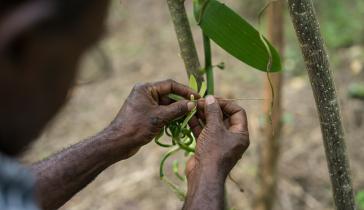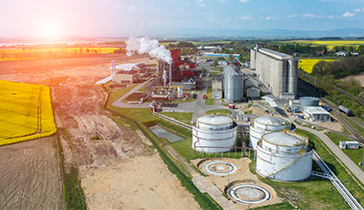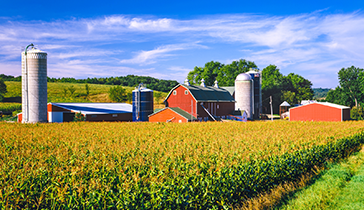Day two of BIO's 2019 World Congress started bright and early with hundreds of global biotechnology leaders—including company executives, researchers, investors, and government officials—arriving in Des Moines for sessions, company presentations, partnering, and BIO's Start-Up Stadium.
Here are a few highlights from the second day at #BIOWC19…
The New Food Revolution: #BIOWC19’s first plenary session was a full house and featured an opening speech by a special guest, Iowa Governor Kim Reynolds.

- "We are proud of our reputation for crop production, and we’re discovering new uses for them and changing the way we manufacture the food, feed, fuel, and materials demanded by the ever-growing global population."
And the session later became an engaging conversation on how the food supply chain is being disrupted with cutting-edge technology and innovative ideas. Strategic Avalanche Consulting President James Iademarco opened the panel conversation saying, “I would assert that we are witnessing the beginning of a revolution in both our agriculture and our food technologies.”
By the end of the conversation, the panel—which included Amyris’ Jim Iacoponi, Triton Algae Innovations’ Xun Wang, and Spruce Capital Partners' Roger Wyse—agreed that biotechnology is at the forefront of the journey to innovate food and, in years to come, we will see exciting new developments that can help address our food supply challenges.
The panel also identified emerging trends in the food market, which have caught the attention of consumers and Wall Street:
- Jim Iacoponi: "The millennial generation is driving a sea change in the way we think about what sustainability means and how we care about the world we live in."
- Xun Wang discussed how technologies like CRISPR can improve nutrition in our food and also highlighted alternative proteins. "Alternative proteins is a hot space. Just look at the success of Impossible Foods and Beyond Meat," said James Iademarco.

BIO Buzz Center With USDA’s BioPreferred Program: USDA hosted a packed breakout session at #BIOWC19, highlighting the economic progress of the bio-based products industry and the agency’s BioPreferred Program. Kate Lewis, senior program analyst for USDA’s BioPreferred Program, stopped by the BIO Buzz Center to talk about the industry’s progress and the evolution of the BioPreferred Program.
BIO Buzz Center with Damien Perriman, Genomatica: Thanks to innovations in industrial biotechnology, we can source these key ingredients with renewable resources like crops. Damien Perriman, senior vice president of specialty chemicals for Genomatica, stopped by the BIO Buzz Center to talk about how the adoption of renewable chemicals to make consumer products will help reduce environmental impact and sustain production.
Back-to-Back TED Talks: Sustainability + Shared Values: A trio of speakers explored the role shared values play in technology development, food production, and food marketing. How are sustainability goals incorporated along the food value chain and how does that influence the use of emerging technologies? Natalie DiNicola of Benson Hill Biosystems pointed to the enormous diversity within nature that can be drawn upon to improve the sustainability of our food supply. Innovations, such as gene editing, take advantage of biology’s capabilities within nature to make food crops and animal agriculture more resilient and productive.
- DiNicola: "We have a chance to reposition the role that innovation plays in improving our food system."
Nick Goeser of U.S. Farmers & Ranchers Alliance said that the production agriculture community has placed a tremendous value on environmentally friendly farming practices.
However, David Fikes of the Food Marketing Institute said translating that to the consumer continues to be a challenge.
- Fikes: "Benefits to consumers are like jokes: if you have to explain it to them, it’s not a consumer benefit."
Beyond Mandates - How States and Provinces Are Driving the Next Wave of Biofuel Growth: California’s low carbon fuel standard has driven investment in renewable fuels, and other states – and even countries – have noticed the return on investment. With a clean fuels standard, states and countries can embrace innovative, environmentally friendly technology and reduce harmful pollution cost-effectively.
Queensland Minister for State Development, Manufacturing, Infrastructure and Planning Cameron Dick keynoted the session and shared how his state is a generating a flourishing biofuels industry.
- "Last September, we witnessed an Australian first with the successful commencement of a trial to deliver sustainable aviation fuel through Brisbane Airport’s fuel infrastructure."
- Mirage News (Australia): Queensland biofutures to take centre stage on world stage

Go Deeper: ACT News: More States Follow California’s Lead with Low Carbon Fuel Standard Programs
Advancing U.N. Sustainable Development Goals Roundtable: Suzy Friedman, Environmental Defense Fund (EDF) talked about the value of partnerships, such as EDF's work with the National Corn Growers Association (NCGA) on an initiative announced in November 2018. Friedman and her co-panelist, NCGA’s Nathan Fields, explained how they are working together to scale conservation through data, policy, and farmer outreach.
- Friedman: "At EDF, we really recognize that collaborating with partners in the ag community is crucial to achieving greater environmental sustainability."
Another shared value among this panel is the goal of reducing food waste. Doug Cole of Simplot explained how their Innate potatoes grow just like regular potatoes but are developed specifically to bruise less and produce less asparagine than other potato varieties.
- Cole: "The goal of reducing food waste is one of the reasons we’re members of BIO and driven to help advance sustainability."
Accelerating Aviation Biofuel Market Growth: Chris Tindal, the assistant director of the Commercial Aviation Alternative Fuels Initiative, kicked off the session with an interesting statistic:
- Aviation biofuels have only been around for nearly 11 years but have been fueled more than 180,000 flights, resulting in 80 percent less greenhouse gas emissions.
Joe Ellsworth of Boeing noted that the amount of commercial flights is increasing but carbon emissions are not increasing at the same rate. Therefore, by embracing biofuels we can work towards a downward trend in emissions by passenger flights.
Aaron Robinson of United Airlines shared how the airline has been a leader in aviation biofuels:
- In March 2016, United became the first airline in the world to use biofuel on an ongoing basis.
- United has bought 3 million gallons of biofuel, more than any other airline in the world.
- Through 2018, United has had more than 2700 biofuel flights, resulting in a 60 percent reduction in CO2.
Go deeper: United Airlines Utilizes Biotechnology for Most Eco-Friendly Commercial Flight of its Kind

Lightning Round: The Future of Food is…: A sampling lightning round featuring diverse perspectives on the future of food.
On what will drive advances in biotech innovation in food and agriculture:
- Kathleen Zelman of WebMD: "Where we're going to go from here is really a question of consumer acceptance."
What drives your company to create food products that meet consumer demands while reducing environmental impact?
- Sylvia Wulf of AquaBounty: "When I think of what I'm passionate about, it's really innovation that meets consumers' needs and solves problems."

Join the Conversation: Use #BIOWC19 on Twitter, Facebook, and LinkedIn to engage with attendees, share session discussions, and highlight the benefits of industrial and agricultural biotech. And be sure to follow BIO on Twitter, Facebook, and LinkedIn.




.jpg?itok=5epg0qxZ)














.png)


